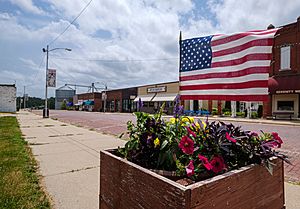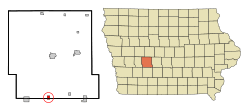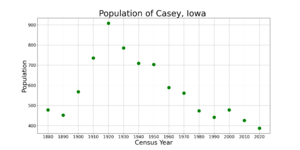Casey, Iowa facts for kids
Quick facts for kids
Casey, Iowa
|
|
|---|---|
 |
|

Location of Casey, Iowa
|
|
| Country | |
| State | |
| Counties | Guthrie, Adair |
| Area | |
| • Total | 0.74 sq mi (1.91 km2) |
| • Land | 0.74 sq mi (1.91 km2) |
| • Water | 0.00 sq mi (0.00 km2) |
| Elevation | 1,280 ft (390 m) |
| Population
(2020)
|
|
| • Total | 387 |
| • Density | 523.68/sq mi (202.17/km2) |
| Time zone | UTC-6 (CST) |
| • Summer (DST) | UTC-5 (CDT) |
| ZIP code |
50048
|
| Area code(s) | 641 |
| FIPS code | 19-11395 |
| GNIS feature ID | 2393766 |
Casey is a small city in the state of Iowa, USA. It is located in both Adair and Guthrie counties. In 2020, about 387 people lived there.
The part of Casey in Guthrie County is considered part of the larger Des Moines metropolitan area. This area includes the cities of Des Moines and West Des Moines.
Contents
History of Casey
Casey was officially planned and laid out in 1869. The town was named after a railroad company. A company called John and James Casey, Contractors, helped build the railroad across Iowa between 1866 and 1869. This railroad went right through where Casey is now. Many of the streets in Casey are named after generals who fought for the Union Army during the American Civil War.
In 2015, the city's old city hall building was destroyed. A new city hall and community center is being built to replace it. This new building will cost about $1 million. Most of the new building will be used as a community center for everyone in Casey to enjoy. The groundbreaking for this new center happened in 2018.
Geography of Casey
Casey covers a total area of about 0.74 square miles (1.91 square kilometers). All of this area is land.
People of Casey
| Historical population | |||
|---|---|---|---|
| Census | Pop. | %± | |
| 1880 | 478 | — | |
| 1890 | 452 | −5.4% | |
| 1900 | 568 | 25.7% | |
| 1910 | 735 | 29.4% | |
| 1920 | 908 | 23.5% | |
| 1930 | 785 | −13.5% | |
| 1940 | 709 | −9.7% | |
| 1950 | 703 | −0.8% | |
| 1960 | 589 | −16.2% | |
| 1970 | 561 | −4.8% | |
| 1980 | 473 | −15.7% | |
| 1990 | 441 | −6.8% | |
| 2000 | 478 | 8.4% | |
| 2010 | 426 | −10.9% | |
| 2020 | 387 | −9.2% | |
| U.S. Decennial Census | |||
Casey's Population in 2020
In 2020, the city of Casey had 387 people living there. There were 177 households, which are groups of people living together. The city had about 523 people per square mile. Most of the people living in Casey were White. A small number of people were from other racial backgrounds. About 1.8% of the population was Hispanic or Latino.
About one-third of the households had children under 18 living with them. The average age of people in Casey was about 43.7 years old. About 23.3% of the residents were under 20 years old. Also, about 19.4% of the people were 65 years old or older. The number of males and females in Casey was almost equal.
Casey's Population in 2010
In 2010, Casey had 426 people. There were 174 households. The city had about 575 people per square mile. Most of the people were White. A small number of people were Asian or from two or more races. About 1.4% of the population was Hispanic or Latino.
About 30.5% of households had children under 18. The average age in Casey was 44.3 years. About 26.1% of residents were under 18. And 19.2% were 65 or older. The number of males and females was very close.
Education in Casey
Students from Casey attend schools in the Adair–Casey Community School District. Younger students go to Adair–Casey Elementary School and AC/GC Junior High School in Adair. For high school, students go to AC/GC High School in Guthrie Center. This is part of a special arrangement between the school districts.
Notable People from Casey
Thomas William Duncan, a famous author, was born and grew up in Casey. His home was at 610 Wallace Street. He was known for writing novels about circuses. His most famous book was Gus the Great, which came out in 1947. Thomas William Duncan passed away in 1987. The local library in Casey is named after him.
See also
 In Spanish: Casey (Iowa) para niños
In Spanish: Casey (Iowa) para niños


